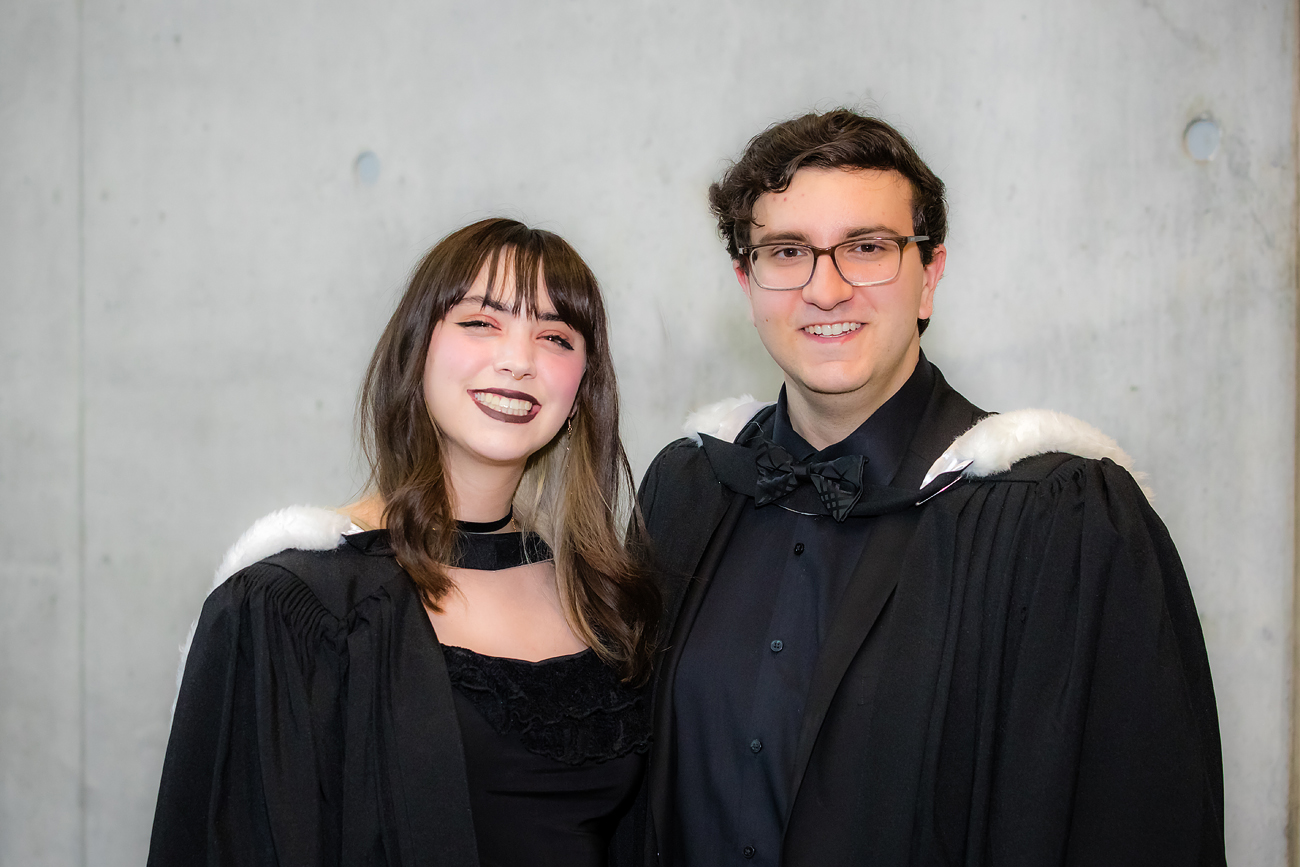Q & A with Fountain School of Performing Arts 2024 graduate Emma Lamont
 Emma celebrates convocation with fellow technical theatre student Lucas Arab.
Emma celebrates convocation with fellow technical theatre student Lucas Arab.
2024 Fountain School graduate Emma Lamont will spend her summer at , an award-winning professional theatre company in residence at the Ross Creek Centre for the Arts as their new production assistant, drawing on the skills and experience she gained at Dal’s technical theatre program.
What led you to your major?
I've always been a big theatre lover. I grew up in a family of artists. From a very young age I was exposed to art in all sorts of ways, but especially theatre. I've always been someone who likes to be around art as it's being created.
I knew very early on I wanted to be a stage manager. It really simplified my process in looking for major and a school. AVľăŔÖ˛ż has a strong program for theatre technicians. My mother took the equivalent of this program in the 80’s.
What's a favorite memory from your early years in the program?
Well, my first year was weird because I started school in 2020 and all my classes were online, but I had still moved into residence. For my whole first year I was just stuck in this tiny little dorm room.  Theatre is such collaborative work that I think everyone really felt the strain of kind of doing it on your own. You really feel the weight of not having a live audience in theater. The actors and audience’s energy is palatable in a room. It was a huge challenge but we created communities in different ways and learned a lot of niche technical skills like broadcasting and live streaming.
What does the Fountain School do uniquely well?
Many other under-graduate theatre school students don't get to experience hands on work. In my second semester of first-year university, I was immediately put to work on a show. I started working professionally after my second year of school because I had already learned so much, doing what is on par to professional work with sometimes very little supervision. That’s quite unique to the Fountain School. Jumping feet first into the work gives you so much confidence.
What was your favorite class or faculty and why?
That’s tough because I truly enjoyed so many of my classes. Roberta Barker is so passionate about everything she teaches; you feel it when you're in a room with her.
Learning about stage management, it’s a lot about leadership. So much of it is knowing what the needs of the production are, what to do when. Effective communication and knowing what to do without being told, is really the core of the work. A lot of artists really benefit from having a stage manager in the room whose job it is to focus on logistics.
How have you changed during your time at the Fountain School?
I’ve developed confidence in my voice these last four years. Torin, our scenic construction faculty looked at me across our final production table meeting and said, “it’s nice to finally hear your voice.” Now I trust that I know what I'm doing and that making mistakes when I don't is also OK. In this type of practical applied learning environment, you are going to make mistakes. Impostor syndrome is so real and scary, but we knew we were in a safe space to learn.
What’s next?
I'm very lucky, I have work lined up for the next year or so. Nova Scotia’s arts community is very welcoming and kind. I hope to continue stage managing for a long time. I think every theater kid, whether want to admit it or not, wants to work in New York City.
I've done Shakespeare, immersive theatre, tiny little experimental shows, and I've worked on mainstage musicals at Neptune Theatre. I've loved all of it.
Advice for new Fountain School students?
I think everybody feels like they're not doing enough, and you are probably doing way too much. The advice that I was constantly given from faculty is to slow down and look after yourself first. Be kind to yourself and trust in your abilities.
What does it mean to be graduating in 2024?
We’ve dealt with some challenges none of us could have ever predicted.
I have solved problems that my professors have never had to solve. I think we are uniquely ready to handle anything that gets thrown our way.
